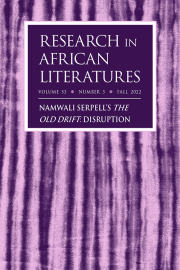
Research in African Literatures 53(3). 1-22. https://www.muse.jhu.edu/article/900030

Research in African Literatures 53(3). 1-22. https://www.muse.jhu.edu/article/900030
“Living in contradictions is what we experience every day. Why do we know so little about it?”
Gisela Febel
“Join us to create more diversity and plurality in knowledge production.”
Gisela Febel
“Foucault speaks of contradiction as l’illusion d’une unité.”
Ingo H. Warnke
“If you think that acts of contradicting someone always need to point to better solutions, you haven’t really understood the idea of democratic critique.”
Martin Nonhoff
“Michel Foucault says: “Where there is power, there is resistance, and […] this resistance is never in a position of exteriority in relation to power” (History of Sexuality I, The Will to Knowledge, 1976, p. 95)”
Gisela Febel